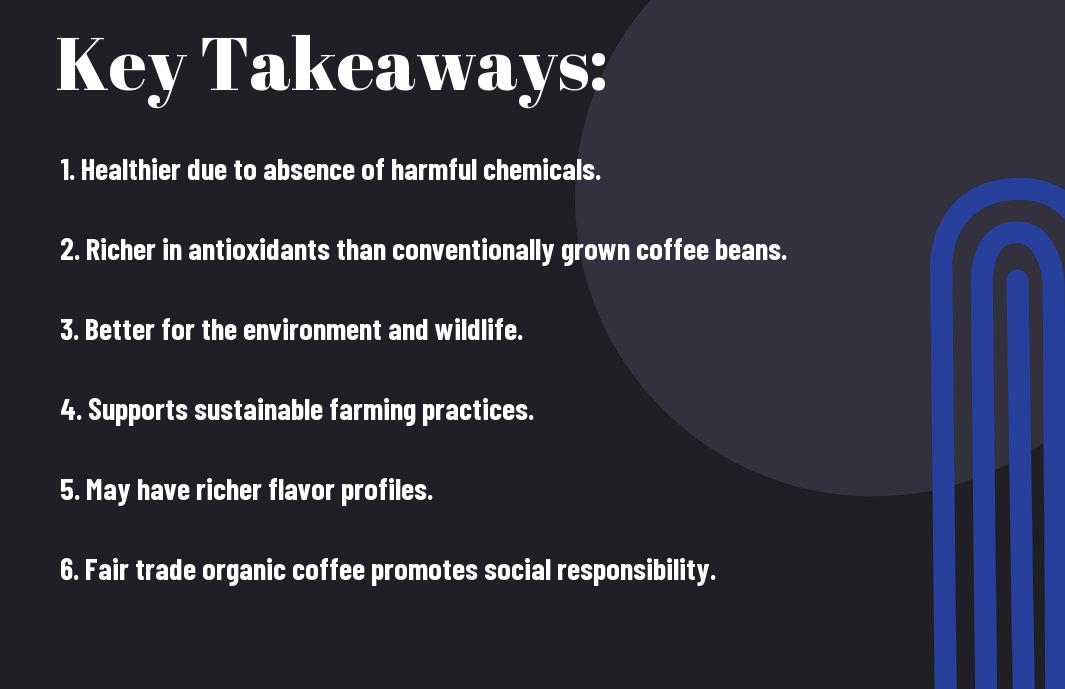It’s a common misconception that coffee is just a morning pick-me-up. The reality is, organic coffee offers a myriad of health benefits beyond just a caffeine boost. From being free of harmful chemicals to having higher antioxidant levels, organic coffee is not just a trend but a healthier choice overall. To learn more about the unique health benefits of organic coffee, check out The Unique Health Benefits of Organic Coffee.

Key Takeaways:
- Health Benefits: Organic coffee is free from harmful chemicals and pesticides, making it a healthier choice for consumers. It is rich in antioxidants and nutrients that can improve overall well-being.
- Environmental Benefits: Organic coffee farming practices promote biodiversity, protect soil health, and conserve water resources. By choosing organic coffee, you are supporting sustainable agriculture and environmental conservation.
- Quality and Taste: Organic coffee is often considered to have a superior taste compared to conventionally grown coffee. The focus on quality, along with ethical sourcing practices, makes organic coffee a popular choice for coffee enthusiasts.
Environmental Benefits
While enjoying a cup of organic coffee, it’s vital to consider the environmental benefits that come with choosing organic. Organic coffee farming practices have a positive impact on the environment through soil conservation, water preservation, and biodiversity protection.
Soil Conservation
An important environmental benefit of organic coffee farming is soil conservation. Organic farms use sustainable practices such as composting, crop rotation, and natural pest control methods. These techniques help maintain soil fertility, prevent erosion, and minimize the use of harmful chemicals that can degrade the soil over time.
Water Preservation
For organic coffee farmers, water preservation is a key concern. By avoiding synthetic pesticides and fertilizers, organic coffee farming reduces the risk of water contamination. Additionally, organic farming practices promote water conservation through techniques like mulching and intercropping, which help retain moisture in the soil and reduce the need for irrigation.
To further support water preservation, organic coffee farmers often implement water-efficient irrigation systems and prioritize water recycling and conservation measures in their operations.
Biodiversity Protection
Benefits of organic coffee extend to the protection of biodiversity. Organic farms maintain a healthier ecosystem by avoiding the use of synthetic chemicals that can harm wildlife and pollinators. By preserving natural habitats and promoting diverse plant and animal species, organic coffee farming helps support a balanced and sustainable environment.
For instance, organic coffee farms often serve as havens for migratory birds and other wildlife, creating a harmonious environment where various species can thrive alongside coffee plants.

Health Advantages
Higher Antioxidant Content
The consumption of organic coffee provides a higher antioxidant content compared to conventionally grown varieties. Antioxidants are beneficial compounds that help neutralize harmful free radicals in the body, reducing the risk of chronic diseases and promoting overall health.
Lower Pesticide Residue
With organic coffee, you can have peace of mind knowing that the beans are grown without the use of synthetic pesticides, herbicides, or fertilizers. This means that the final product is free from harmful chemical residues that can potentially have adverse effects on human health.
Choosing organic coffee also supports sustainable farming practices that prioritize the health of the environment and the well-being of the farmers. By opting for organic coffee, you are promoting a healthier ecosystem and a healthier you.
Improved Heart Health
For those concerned about heart health, organic coffee offers additional benefits. Studies have shown that organic coffee may help reduce the risk of heart disease by lowering inflammation and improving blood vessel function.
Advantages of consuming organic coffee extend beyond just a morning pick-me-up. By choosing organic, you are not only benefiting your own health but also supporting sustainable and environmentally friendly practices in the coffee industry.
Better Taste and Aroma
Unlike conventional coffee, organic coffee is grown without synthetic fertilizers, pesticides, or herbicides. This cultivation method leads to a cleaner cup of coffee that retains the natural flavors of the beans. According to The Benefits of Organic Coffee, organic coffee tends to have a smoother and richer taste due to the absence of chemical residues present in non-organic varieties.
Complex Flavor Profile
With organic coffee, you can experience a complex flavor profile that is not overshadowed by chemical additives. The beans are allowed to develop their full potential, resulting in a more nuanced and enjoyable coffee experience. Organic farming practices promote biodiversity, which can enhance the flavors present in the coffee beans.
Nuanced Aroma
To further enrich your coffee experience, organic coffee offers a nuanced aroma that reflects the natural environment in which the beans were grown. The absence of synthetic chemicals allows for the true scent of the coffee beans to shine through, providing a more authentic and pleasing aroma.
Plus, organic coffee’s environmentally friendly cultivation methods mean that the beans are grown in healthier soil, producing a more robust aroma that translates into a delightful sensory experience with every sip.
Enhanced Sensory Experience
For coffee enthusiasts looking to heighten their sensory experience, organic coffee offers a superior option. The combination of a clean taste, complex flavors, and enticing aromas elevates the overall enjoyment of each cup. With organic coffee, you can truly savor the unique characteristics of the beans and appreciate the care that goes into producing a high-quality brew.
Flavor, aroma, and texture are all aspects of the sensory experience that organic coffee enhances, making each cup a memorable treat for the palate and the senses.

Supporting Sustainable Farming
After discussing the health benefits of organic coffee, it’s necessary to explore into the impact it has on supporting sustainable farming practices. Organic coffee often aligns with fair trade practices, small-scale farming support, and community development initiatives, all of which contribute to the overall sustainability of coffee production.
Fair Trade Practices
Fair trade practices ensure that coffee farmers receive fair compensation for their products, promoting social and environmental sustainability. By purchasing organic coffee that is certified fair trade, consumers can support farmers in developing countries and help improve their living and working conditions. This ultimately leads to a more equitable coffee industry where farmers are paid fairly and have access to resources for sustainable farming practices.
Small-Scale Farming Support
One of the significant benefits of choosing organic coffee is the support it provides to small-scale farmers. Small-scale farming is crucial for biodiversity conservation and maintaining traditional farming practices. By purchasing organic coffee from small-scale farmers, consumers are directly contributing to the preservation of these methods and ensuring that farmers can continue to cultivate their land sustainably.
Agricultural sustainability is necessary for the long-term success and resilience of coffee production. Supporting small-scale farmers through the purchase of organic coffee plays a vital role in preserving traditional farming practices and promoting environmental conservation.
Community Development
Supporting community development is another crucial aspect of sustainable farming practices in the coffee industry. Organic coffee initiatives often include community development projects that focus on education, healthcare, and infrastructure improvements in coffee-growing regions. By choosing organic coffee, consumers can contribute to the overall well-being of these communities and help create a more sustainable future for all involved.
Development projects funded by organic coffee sales can have a lasting impact on coffee-growing communities by empowering residents and creating opportunities for economic growth and social development. This holistic approach to sustainable farming not only benefits farmers but also supports the broader community in which they live.
Economic Benefits
Higher Price for Farmers
Economic benefits of organic coffee include a higher price for farmers. Organic coffee is often sold at a premium price compared to conventional coffee, which allows farmers to earn higher incomes. This increase in revenue can help support their families, invest in their farms, and improve their overall quality of life.
Local Economic Growth
On top of providing a higher income for farmers, organic coffee cultivation can also lead to local economic growth. When farmers receive a fair price for their organic coffee beans, they are more likely to reinvest in their communities, supporting local businesses and infrastructure. This reinvestment can have a ripple effect, boosting the overall economy of the region.
To further promote local economic growth, some organic coffee cooperatives prioritize community development projects. This can include building schools, healthcare facilities, and other much-needed resources for the community. By choosing organic coffee, consumers are supporting these initiatives and contributing to the sustainable development of coffee-producing regions.
Job Creation and Security
Creation of jobs and economic security are additional economic benefits of organic coffee production. Organic coffee farms often require more labor-intensive practices, leading to a higher demand for workers. This increase in employment opportunities can help reduce unemployment rates in rural areas where coffee is grown, providing job security for many individuals.
Local workers are imperative in the organic coffee production process, from planting and harvesting to processing and packaging. By supporting organic coffee production, consumers are not only promoting environmentally sustainable practices but also helping to create and maintain jobs within the community.
Social Responsibility
To Does organic coffee have health benefits for antioxidants? is not only about personal health benefits but also about social responsibility. By choosing organic coffee, consumers support environmentally friendly practices that promote sustainability and protect ecosystems.
Fair Labor Practices
The commitment to fair labor practices is a hallmark of organic coffee production. Farmers and laborers involved in the cultivation and harvesting of organic coffee are often provided with better working conditions, fair wages, and access to education and healthcare. This ensures a more equitable distribution of wealth and resources within the coffee supply chain.
Community Involvement
Involvement in the community is another crucial aspect of organic coffee production. Organic coffee farms often engage with local communities, supporting educational programs, infrastructure development, and healthcare initiatives. By fostering a symbiotic relationship with the communities in which they operate, organic coffee producers contribute to social development and overall well-being.
Labor practices on organic coffee farms prioritize the welfare and empowerment of workers. By ensuring fair wages, safe working conditions, and opportunities for personal and professional growth, organic coffee producers create a positive and sustainable impact on the lives of their employees and their families.
Environmental Stewardship
For organic coffee producers, environmental stewardship is a core value. By employing practices such as shade-grown cultivation, composting, and natural pest control methods, organic coffee farms protect biodiversity, soil health, and water quality. This commitment to sustainable agriculture minimizes the ecological footprint of coffee production and safeguards the planet for future generations.
Another benefit of organic coffee is the conservation of natural resources. Organic farming practices promote soil conservation, water management, and biodiversity, contributing to the preservation of ecosystems and the mitigation of climate change. By choosing organic coffee, consumers support these efforts towards a more sustainable and harmonious relationship with the environment.
Conclusion
Ultimately, the benefits of organic coffee go beyond just the lack of harmful chemicals and pesticides. Choosing organic coffee also supports sustainable farming practices that are environmentally friendly, promotes biodiversity, and ensures fair wages for coffee farmers. Additionally, organic coffee is often of higher quality, with a richer flavor profile that reflects the care and attention to detail that goes into its production. By making the switch to organic coffee, not only are you prioritizing your health, but you are also contributing to a more sustainable and equitable coffee industry.
FAQ
Q: What is organic coffee?
A: Organic coffee is grown without the use of synthetic pesticides, herbicides, or fertilizers. It is cultivated using sustainable farming practices that focus on soil health and biodiversity.
Q: What are the benefits of drinking organic coffee?
A: Organic coffee is free from harmful chemicals, making it better for your health and the environment. It also tends to have a richer flavor profile due to the careful cultivation methods used.
Q: How does organic coffee benefit the environment?
A: Organic coffee farming practices promote soil health, water conservation, and biodiversity. By avoiding synthetic chemicals, organic coffee production helps protect ecosystems and wildlife.
Q: Is organic coffee healthier than regular coffee?
A: Organic coffee is often considered healthier than regular coffee because it is free from potentially harmful residues of synthetic pesticides and fertilizers. It also retains more antioxidants and nutrients due to the natural cultivation methods.
Q: Where can I find organic coffee?
A: Organic coffee is widely available in specialty coffee shops, health food stores, and online retailers. Look for certifications such as USDA Organic or Fair Trade to ensure you are purchasing genuine organic coffee.
What are the best coffee regions in the world





